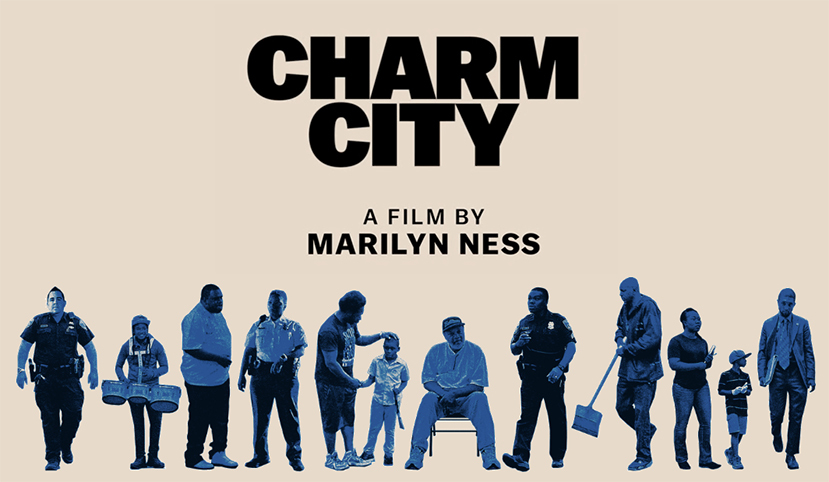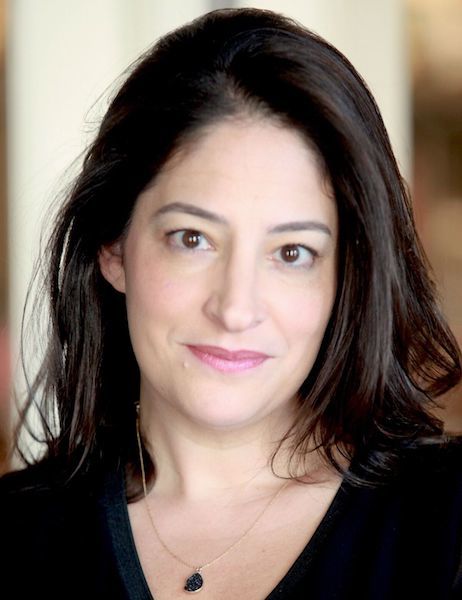
It’s a tall order—asking a native New Yorker to make a documentary about violence in the streets of Baltimore that doesn’t feel like dilettantism or cultural tourism—but filmmaker Marilyn Ness is more than up to the challenge. Her Charm City, which premieres this Friday at the Parkway Theatre, was filmed over a three-year period in Baltimore just before and after Freddie Gray’s death and the subsequent Uprising, and takes a look at our crime problem from a variety of perspectives—the cops, the lawmakers, and those living the life, every day on the streets.
Charm City manages to feel equal parts authentic, despairing, and open-hearted, and it even leaves some room for hope. I had a chance to talk to Ness about her journey creating the film. About two-thirds through the interview, Clayton “Mr. C” Guyton, the director of the Rose Street Community Center and one of the film’s stars, stops by and joins our conversation.
How did you decide to film in Baltimore?
MN: I had been reading about all the deaths in police custody, you know, these African-American men, these high-profile deaths and I thought, “There’s never context.” So we wondered what would it look like if you went to a city where there was both the police and the policed and tried to see what was happening day in and day out other than just reflecting on the cataclysmic moment that the news tends to focus on. We had called the Department of Justice and said, “Where’s a city you think is trying to find a way forward?” and they were like, “Hands down, Baltimore.” We came down here in December of 2014.
Right before Freddie Gray.
MN: We had been here for four months before Freddie Gray . . . and we stayed and filmed, just sort of staying the course of what we had planned to do. We had two epiphanies. [One] epiphany was this: No matter how [big the cataclysm] and no matter how much leadership changed at the top, what it meant to be a patrol officer on the ground or a community member just trying to get by didn’t change really. It turns out day in day out life is the same. Everyone’s just doing life.
What was the second epiphany?
MN: We wound up being in Baltimore during the three most violent years in recent history and, whether you were with community members or police officers, they all talked about it in the same way. It was like, “What can we be doing as individuals to try to change the equation, how do communities life themselves up?” And we realized there was more similarity than difference as they talked to us. Not to say there wasn’t major tension and anger and years of distrust that had been built, but they were kind of coming at things from the same place. That to us also felt like an epiphany. The media will pit communities of color against police officers and vice-versa. There was a way in which everyone was singing the same song.
The film feels pretty sympathetic toward the police.
MN: These are issues that the communities and cities haven’t been able to solve for years and yet we feel comfortable sending in police officers often very young, 22 to 25 years old, with guns who are looking at this problem day in and day out. And we started to think, maybe we’re asking police to do too much.

Director Marilyn Ness
Did you have concerns about being an outsider who comes into Baltimore? That maybe this wasn’t your story to tell?
MN: So it’s completely a concern I had coming in. The way we tried to deal with it, actually my whole crew was local. My PA [production assistant] wound up being my co-producer, a woman named Meryam Bouadjemi—she knew this town, loves this town, is from this town. I said to her, “We’re not looking to do a slam job. We’re really trying to understand what is the beating heart here.” She threw herself in and was incredibly committed to helping make sure we saw all those sides of Baltimore.
Everyone seems so relaxed in front of the camera. What was that process like?
MN: We spent months without a camera. As soon as you put a camera in the mix, that human interaction ends. And then I slowly added the camera. The first days are useless. Everyone is still uncomfortable and doesn’t even know how to walk through a door with a camera following them. Over time, everyone gets their groove on. And then they kind of forget that we’re there. My scariest moment was when we screened the film for all the subjects. Thankfully, everyone felt that we represented their truth and this was the city they knew and understood and that we captured that.
Mr. C, one thing I sensed watching the documentary, the people in your neighborhood really trust you.
CG: You have to be there for them. No matter what time it is, 1 am, 3 am—if you’re angry and you want somebody to talk to, or you may not even want somebody to talk to, try us. Try us.
That’s a slow process. They have to feel that somebody, not necessarily that they feel your pain, but that you’re willing to walk with them. You got be real about that. . . . And once they know you’re totally committed, that’s half the battle.
MN: You watered the garden no matter which flower it was. And one day they need you and you’ve done the work that lets them come to you. We felt that from the first days we met you. I didn’t understand what I was seeing. But you understood that these guys, who look hard and tough and mad, were here with you and showing up for the [daily Rose Street Community Center] meetings and hearing the word and you could see love.
CG: They give what they get. You love them, they love them back.
Mr. C, tell me your reaction to seeing the film
CG: It’s like looking at a picture of yourself. The first time I looked at the film, I didn’t really feel it. I was distant, for whatever reason. No reaction. The second time, the ice melted a little bit. The third time, there were some parts that made me tear up.
You’ve screened the film at Tribeca and at the Maryland Film Festival. What’s that reaction been?
MN: I will say this about Mr. C, because he’s too humble: People are incredibly moved by him and the power of what he’s doing. They walk away from the film feeling hope, that there are people on the ground trying to stem the tide [of violence] with love.
